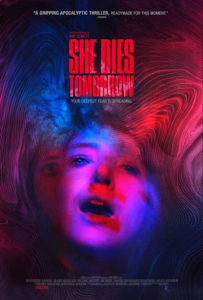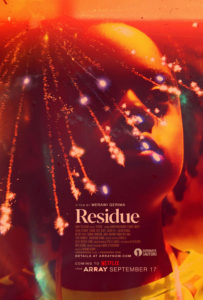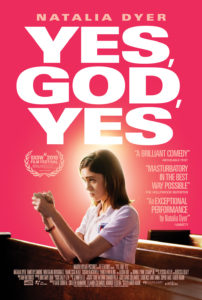I Wake Up Streaming: December 2020
Movies
In this edition of “I Wake Up Streaming,” novelist William Boyle rounds up his top streaming picks for the month of December. The column’s name is a play on the 1941 film I Wake Up Screaming, starring Betty Grable, Victor Mature, and Carole Landis. While the film’s title hits a pleasing note of terror and despair, changing that one letter speaks to the joy of discovering new films and rediscovering old favorites, as well as the panic that comes with being overwhelmed by options.
This year has felt like a hundred years. We don’t need to get into any of that. Let’s talk about movies, which have played a major part in getting me through. I’ve been watching movies seriously since I was a kid. At age thirteen, I was already trying to watch ten movies a week. Other kids I knew had pals; I had movies and books and cassette tapes. I know I’m not alone in that. I’ve leaned on movies harder than ever in this train wreck of a year. I’ve always said that my ideal day consists of writing from five a.m. to noon and then spending the rest of the day hanging out with my family, reading, listening to music, and watching at least one movie. Well, with my job duties moving online, my days have pretty much been like that for the last nine months and—despite all the terror that the world holds—it’s been a great routine.
In a typical year, I probably watch somewhere in the neighborhood of two hundred and fifty movies. That’s a ton, I know. Way more than the average person but way less than film critics and hardcore cinephiles. This year, I’ve more than doubled that. I’ve logged five hundred and fifty-four entries on Letterboxd. (If you’re not familiar with Letterboxd, it’s my favorite social media site, a place where I’ve kept track of my viewing habits for the last seven years, where I read reviews and see where and how stuff is available to watch.) Most of my entries are feature length films, though there are a few limited-run series and a handful of shorts included. I’ve averaged eleven movies a week, besting records I set for myself as a kid hungry to rent everything I could from my local dive video joint. A small fraction, probably ten percent, are movies released in 2020. The rest are older. About fifty-five percent are first-time viewings. The rest rewatches. Obviously, I like the stats function on Letterboxd.
One of the most interesting things about keeping track of stuff like this is noticing trends. Logging films really encourages me to go on runs, exploring an actor’s or director’s filmography as fully as I can. I’ve always done that on some level, I guess, but it seems to have intensified this year with more time to watch and higher availability of movies via a wide variety of streaming services. This year, I’ve gone on a number of kicks. Early on in lockdown, we lost Lynn Shelton, one of my favorite directors of the last twelve or thirteen years. It was a heartbreaking loss on so many levels. I rewatched her entire filmography (but not all of her TV work), including a short (The Clouds That Touch Us Out of Clear Skies) accessed via Seattle Channel and the comedy specials she directed for Marc Maron. I’d say the movie of hers that hit hardest for me this time around was Touchy Feely (2013), currently available on Tubi and (for a few more days anyway) via the Magnolia Selects channel on Prime Video. There’s no doubt that it’s Shelton’s most personal movie, with Rosemarie DeWitt’s Abby serving as her stand-in. Abby’s a massage therapist who has developed an aversion to bodily contact, while her brother Paul (Josh Pais), a high-strung dentist, becomes a new person when clients begin to seek out his “healing touch.” Elliot Page, Allison Janney, and Ron Livingston co-star. The musician Tomo Nakayama is also in the movie, and he plays his song “Horses,” which I’ve returned to about a million times since the spring and have put on almost every playlist I’ve made. The emotional center of Touchy Feely is so earnest and honest that this viewing—watched through the lens of Shelton’s passing—wrecked me beyond words.
Probably the most substantial kick I’ve gone on is digging into Mickey Rourke’s filmography. In the last couple of months, I’ve watched twenty Rourke movies. I grew up in the ’80s and ’90s, and I’ve always loved him as an actor. It had been a while since I’d revisited many of these movies, and I’d never watched so many in such a short span of time. Of course, watching this way opens up new things. Seeing how an actor develops and falls apart. Seeing it all in line. The energy, enthusiasm, and vulnerability that makes him unique. The slow fade out of respectability into grimy B action pictures. Seeing it all come back, against the odds. Probably the biggest highlight of my Rourke kick was watching Homeboy (1988), his passion project, for the first time in thirty years. It’s currently streaming on Prime Video and Tubi. A sad sack boxing melodrama set in Asbury Park, New Jersey, it deals in small-timers and could’ve-beens. It’s trembling, melancholy, beautiful. The stuff of a Springsteen song. Rourke Brando-broods through it as scrubby pugilist Johnny Walker, slouching, his face a wreck of emotions. He’s dressed like a Bon Jovi cowboy, all denim and drama. Rourke wrote the script (using the alias Eddie Cook), and it’s restrained and fragile, a tragic ’80s power ballad mixed with the soul of a character-driven ’70s crime drama. Johnny is a decent guy who’s never been around other decent people—that might be the greatest tragedy of all. As a fighter, he’s all heart and sincerity. The movie, too, is all heart and sincerity. Rourke’s performance is powerful. It feels lost to time now, but there was nobody quite like him in his prime, so unafraid of being tough and tender, so genuine is his sadness, lostness, and confusion. A real heir to Brando and Clift and Dean. He does so much with his face. The jaw and mouth, the drooping eyes, the look of a man who’s never won, who never will win. You can hear me talking about Homeboy and my other favorite Rourke performances to my friend Jen Johans on her podcast, Watch with Jen.
Since this is a column about streaming picks, I’m going to avoid doing a favorites of the year list here. Several of my favorites won’t hit streaming services for a while. Aside from that, there are still so many 2020 films I’m dying to see (Chloé Zhao’s Nomadland is at the top of that list). Instead, I figured I’d close out this column and year by focusing on some favorites that are streaming. First, here are three movies that will definitely be among my top recommendations of the year:
She Dies Tomorrow (Hulu)

I wrote about Amy Seimetz’s 2012 directorial debut, Sun Don’t Shine, in a previous column, and her follow-up, She Dies Tomorrow, was one of my most anticipated movies of the year. I love Seimetz and stars Kate Lyn Sheil and Jane Adams, so I went in ready to love this. I know everybody’s talking about how this is the perfect film for our current moment—it’s boring to just echo that sentiment, but I’m going to do it anyway. It captures the tone of 2020 in a prescient and unsettling way, considering that it was finished before the plague days. Honestly not sure how I would’ve viewed it otherwise—it’s such an effective portrait of the purgatorial existence we’re all living through now, where contagion happens silently, where the immediate future is frightening and mysterious. Some truly inventive, haunting sequences. Sheil and Adams are two of my favorite actors, and I love how many close-ups of them there are. Tunde Adebimpe, Michelle Rodriguez, Katie Aselton, Kentucker Audley, Chris Messina, Jennifer Kim, and Josh Lucas are all terrific. Great sound design throughout. I should also say it’s not all dread and anxiety—there are plenty of weird and funny moments. In fact, Seimetz calls it a “secret comedy” in her Pure Cinema interview. Absurd, compelling, tense as hell.
Residue (Netflix)

Merawi Gerima is the son of filmmakers Haile Gerima and Shirikiana Aina. His first feature, Residue, which he wrote, directed, edited, and produced, is a heart-rending meditation on home, place, racism, masculinity, gentrification, loss, and art. The film stars Obinna Nwachukwu as Jay, an aspiring filmmaker who has come home to his old Washington, DC neighborhood to find it changed and to face down ghosts of his past. One of the most effective portrayals of memory I’ve ever seen on film—the haziness of it, the crispness of some images and dullness of others, echoes of echoes of echoes. Gorgeously shot. Feels collage-like at points, capturing DC in claustrophobic close-ups and lingering shots of neighborhood things—rusty fences, drain covers, alleys, stoops, yards—and all the simultaneous sounds, jolting back and forth between quick bursts of the past and a rumbling, unsteady present. I love how close we stay to Jay for so long. In one tense police encounter, we see police lights and hear a cop but don’t see him. The same goes for the gentrifiers, who we only see Peanuts-style, legs, backs, blurry faces, brunchy voices. I won’t spoil the main shift away from Jay, but it’s powerful. A beautiful film. Can’t wait to see what Gerima does next.
Yes, God, Yes (Netflix)

I survived twelve years of Catholic school. From 1984-1996. This movie had me from the go. A Catholic schoolgirl coming-of-age story set in the year 2000. The first feature by the writer of Obvious Child, Karen Maine. The easy comparison is Lady Bird, but this feels different in tone and setting and in a host of other ways. Natalia Dyer gives a knockout lead performance, but there’s no one here doing what Laurie Metcalf and Tracy Letts and Beanie Feldstein are doing in Lady Bird. Dyer carries it on her shoulders, and she’s flawless. That said, the two short scenes with Susan Blackwell’s Gina are the beating heart of the movie—Dyer’s Alice seeing that there’s a whole big world outside the narrow one she’s known. This is a movie about finding truth in a lonely sea of bullshit, and it’s both funny and moving as hell. After watching, I was reading some reviews and stumbled across a take on it in the Catholic News. They gave it an “O” for morally offensive. Of course they did. A movie that tries to reckon honestly with hypocrisy and faith. A movie that’s this tender. These are the main takeaways in that review: 1) “Sex is more fun than being Catholic […] [is] the basic message of writer-director Karen Maine’s semi-autobiographical drama Yes, God, Yes.” 2) “Bearing false witness, it seems, is all part of growing up and achieving liberation.” The review also claims that the film contains “anti-Catholicism” and complains that it features “aberrant behavior.” I mean, I guess if I had written and directed this, I would want the Catholic News to hate it, but the reviewer’s argument is still in bad faith. Anyhow, I loved Yes, God, Yes. Dyer’s brilliant. A great script. I love that it comes in at an economical seventy-five minutes. While I also loved Lady Bird, it didn’t really aim to dissect the Catholic School Experience in the same way, which explains why Catholic reviewers adored it. Yes, God, Yes manages to make harsh criticisms and yet balances them delicately with notions of exploration and discovery. What’s off-limits, what we’re taught should fill us with guilt and fear—that can be holy, too.
Finally, here are some other 2020 releases I loved that are currently streaming:
Lovers Rock, Steve McQueen (Prime Video)
Tommaso, Abel Ferrara (Kanopy)
Time, Garrett Bradley (Prime Video)
WHAT DID JACK DO?, David Lynch (Netflix)
The Forty-Year-Old Version, Radha Blank (Netflix)
John Was Trying to Contact Aliens, Matthew Killip (Netflix)
I’m Thinking of Ending Things, Charlie Kaufman (Netflix)
The Way Back, Gavin O’Connor (HBO Max)
Dick Johnson is Dead, Kirsten Johnson (Netflix)
Da 5 Bloods, Spike Lee (Netflix)
Never Rarely Sometimes Always, Eliza Hittman (HBO Max)
Bacurau, Kleber Mendonça Filho & Juliano Dornell (Criterion, Kanopy)
William Boyle is the author of the novels Gravesend, The Lonely Witness, A Friend Is a Gift You Give Yourself, and City of Margins, and a story collection, Death Don’t Have No Mercy. His novella Everything Is Broken was published in Southwest Review Volume 104, numbers 1–4. His writing on film has appeared in Oxford American and CrimeReads. He used to have a blog about ’70s crime films called Goodbye Like a Bullet. His website is williammichaelboyle.com.
More Movies
